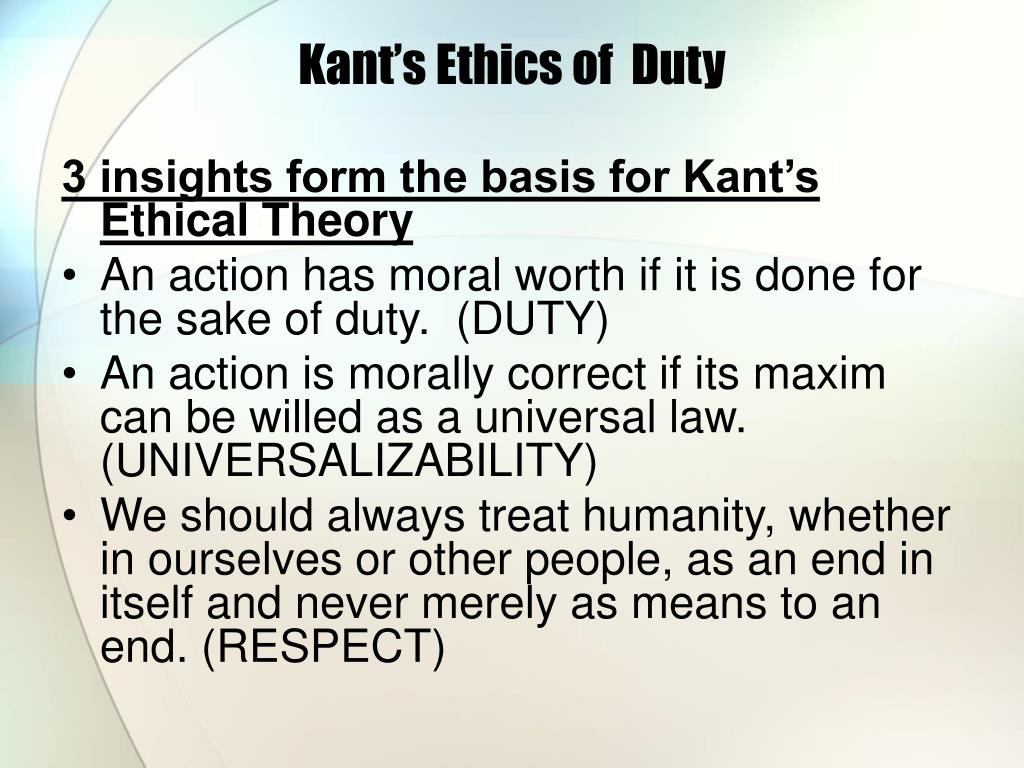Business Ethics Kantian Theory
Business Ethics Kantian Theory. • ohreen, david, and roger petry. A kantian approach. journal of business ethics 106.3 (2012):

Indeed kant’s influence on that branch of ethical theory known as deontology is so strong that some writers simply refer to deontology as kantianism. This new edition, for graduates and academic researchers in the field of business ethics, has been heavily revised to include the newest scholarship on kantian ethics, with a new emphasis on kant's later moral and political theory, a workable account of kantian capitalism, and additional accounts on corporate social responsibility, kantianism and human rights, corporate moral. 1 this revised version of my 1994 ruffin lecture owes significant debts to a large number of people.
• An Action Is Only Truly Moral If It Is Morally Motivated.
According to deontology, there are certain absolute (or nearly absolute) ethical rules that must be followed (for example, the rule that we must respect people’s privacy, and the rule that says we must respect other people’s right to make decisions about their own lives). Kantianism and utilitarianism specifically for you. Morality in this theory is absolute, the actions of right or wrong is independent from consequences.
Instead, He Focused On Motives And The Willingness Of Individuals To Act For The Good Of Others, Even Though That Action Might Result In Personal Loss.
In 1997 freeman and evan published an article proposing a kantian stakeholder theory of corporate responsibility, which was (from 1998) included in “ethical theory and business”, the cambridge university press reference work in this area. The key aspect in this is goodwill, which is the ability to act out of duty and principle (seedhouse, 2001). I received thoughtful comments from those attending the ruffin lecture, as well as those attending the society for business ethics meeting in boston in december 1994.
Kant Believed That Categorical Imperative Is Absolute Command And Moral Law.
Indeed kant’s influence on that branch of ethical theory known as deontology is so strong that some writers simply refer to deontology as kantianism. Bowie makes the point that “the categorical imperative is not irrelevant in the world of business” (7). This new edition, for graduates and academic researchers in the field of business ethics, has been heavily revised to include the newest scholarship on kantian ethics, with a new emphasis on kant's later moral and political theory, a workable account of kantian capitalism, and additional accounts on corporate social responsibility, kantianism.
This New Edition, For Graduates And Academic Researchers In The Field Of Business Ethics, Has Been Heavily Revised To Include The Newest Scholarship On Kantian Ethics, With A New Emphasis On Kant's Later Moral And Political Theory, A Workable Account Of Kantian Capitalism, And Additional Accounts On Corporate Social Responsibility, Kantianism And Human Rights, Corporate Moral.
A kantian perspective. business ethics quarterly 21.2 (2011): 10 full pdfs related to this paper. Ethics are the principles which enable an individual to identify and practice virtues as well as identifying vices and avoiding them.
Kant's Theory Expresses The Importance Of Treating People As Ends In Themselves Rather Than Only As A Means To An End.
Kantian approach to business ethics. It helps to promote good values in society…. The kantian theory is said to be the most remarkable of all deontological theories primarily in its premise that actions are not justified by their consequences (prakashan 55).
Post a Comment for "Business Ethics Kantian Theory"